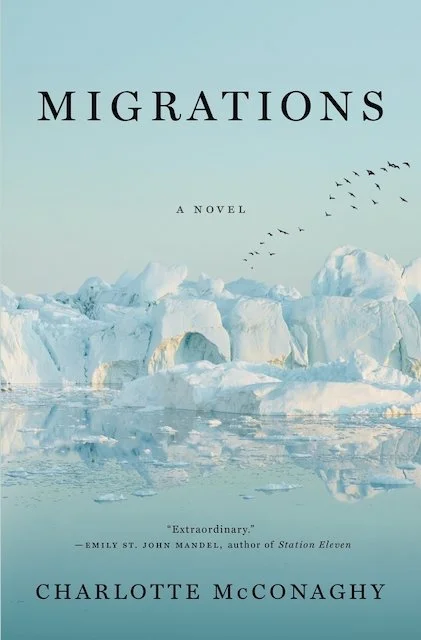Migrations by Charlotte McConaghy
In a world of the not too distant future, Franny Stone decides to follow the last of the Arctic terns on what could be their final migration to Antarctica. Giving up everything, she talks her way on to a fishing boat, but it isn’t long before we learn about her own dark past, and how it might overwhelm her. But what is she running from?
Dystopian
If the natural world described here is depressing, it’s because it’s frighteningly realistic. Fishing is close to being banned, and most species have already vanished because of climate change. Emily St John Mandel, one of my favourite writers of the moment, gives the book the thumbs up on the cover, and it certainly put me in mind of modern classic ‘Station Eleven’.
This is a world where the sighting of a rare barn owl or a wolf can inspire open mouthed awe as something approaching a miracle. There’s a sense throughout of - what have we done?
‘If the animals have died it will not have been quietly. It will not have been without a desperate fight. If they've died, all of them, it's because we made the world impossible for them.’
Emotional
This is an emotionally devastating book, at the heart of which is the damaged Franny. There is a darkness in her past and she’s such a relatable character - you can really feel how fragile she is, and it becomes clearer as we read on. She’s running from a terrible crime, and obviously tormented by it.
Like her mother, she is a wanderer, and her life has been one of abandonment and sadness. There is a sense throughout, especially in the letters to her husband, that like the terns, this is to be her last journey.
‘I decided to follow a bird over an ocean. Maybe I was hoping it would lead me to where they’d all fled, all those of its kind, all the creatures we thought we’d killed. Maybe I thought I’d discover what cruel thing drove me to leave people and places and everything, always. Or maybe I was just hoping the bird’s final migration would show me a place to belong.’
The crew are a motley bunch, many of whom are damaged in their own way, not least of which is the captain. They are initially suspicious, not helped by the fact that she sleepwalks on the deck. Eventually they become a family to her, and there are plenty of moments of humour and emotion.
Storytelling
Like the icy landscape the boat is heading towards, there’s something clear and concise about the prose here. If I’ve made the book sound heavy, it certainly doesn’t read like that - it’s my favourite of genres, the literary page turner. It’s never bogged down in detail, and I found the sections in Ireland particularly evocative It might jump back to the past a lot, but it’s never at the expense of the narrative drive.
It’s a while since I’ve felt so much when reading a book. There’s a vein of sadness and hopelessness throughout, and there were times I just had to sit with it for a while. I’m perfectly fine with that, and ‘Migrations’ is both a gorgeous and devastating read.
‘But there won’t be any more journeys after this one, no more oceans explored. And maybe that’s why I am filled with calm. My life has been a migration without a destination, and that in itself is senseless. I leave for no reason, just to be moving, and it breaks my heart a thousand times, a million.’
Published by Vintage October 4th 2020
240 pages paperback


